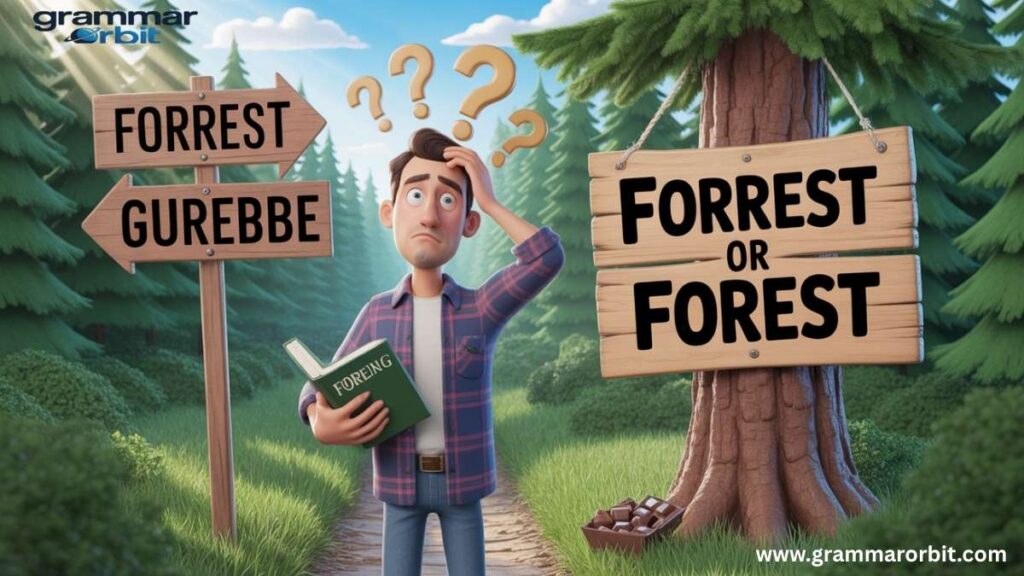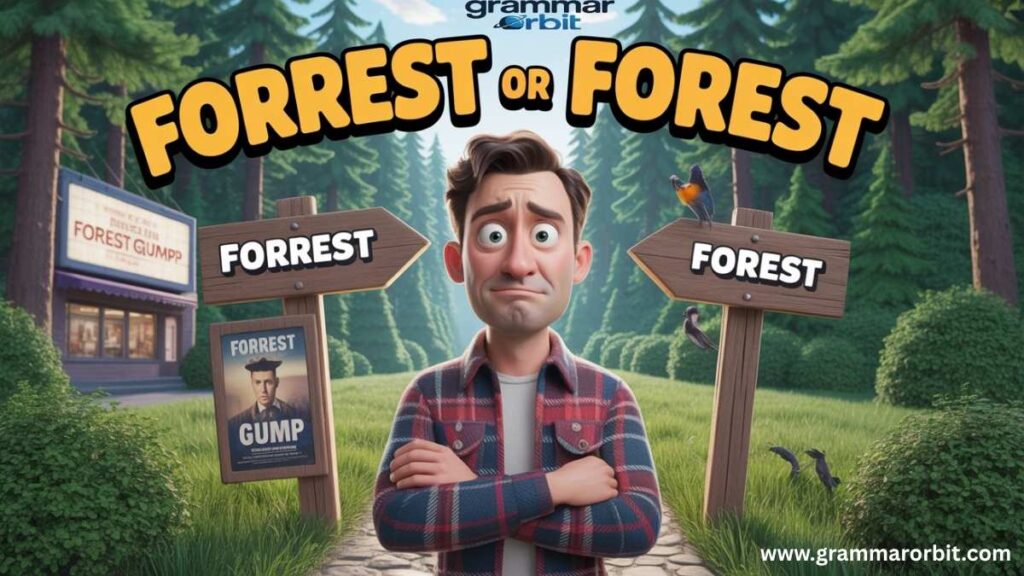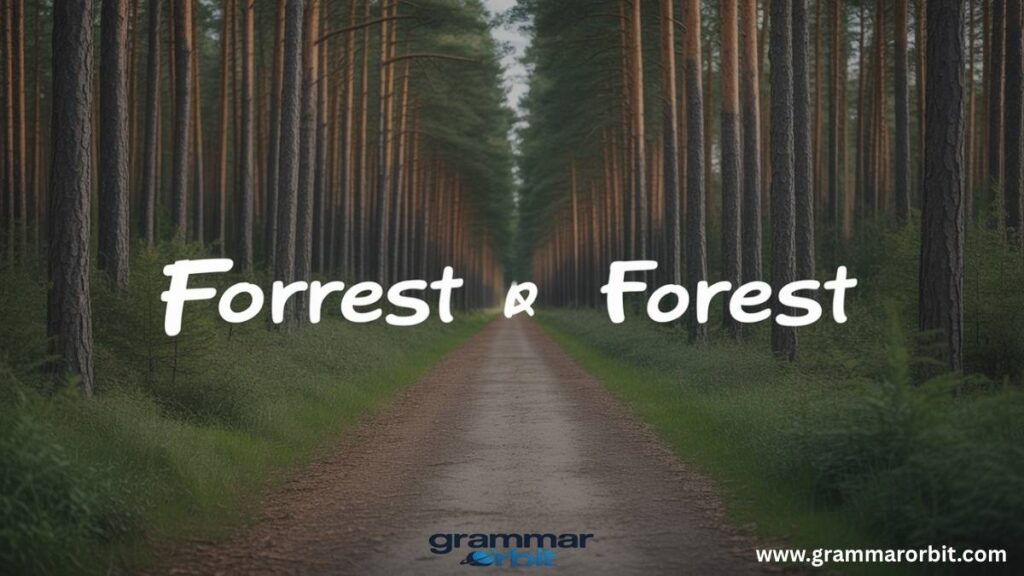Have you ever stopped mid sentence wondering whether it’s Forrest or Forest? Don’t worry you’re not the only one wandering through this linguistic jungle! At first glance, both words look almost identical, but one refers to trees and wildlife, while the other might remind you of a famous guy who ran across America saying, “Life is like a box of chocolates.” The difference between Forrest and Forest might seem tiny, but it can completely change your sentence’s meaning. So, grab your grammar compass, lace up your mental hiking boots, and let’s explore the wild world of Forrest vs Forest without getting lost in the woods!
Forest vs Forrest: Quick Answer
Here’s the short version before we dive deep.
- Forest means a large area filled with trees.
- Forrest is a person’s name.
So when you talk about nature, trees, or the environment, use forest with one R.
When you talk about a person’s name, like Forrest Gump, use Forrest with two R’s.
Meaning of Forest
The word forest means an area covered with trees and plants. It’s a common noun, which means it refers to a general thing, not a specific name.
Examples of forest in sentences:
- The forest stretched for miles across the mountain valley.
- Many animals depend on the forest for food and shelter.
- A forest can help regulate the planet’s temperature and air quality.
Forest synonyms
- Woods
- Jungle
- Timberland
- Rainforest
- Grove
Each term describes land with trees, but forest usually means a large, dense area. The word also appears in combinations like tropical forest, boreal forest, and temperate forest.
Meaning of Forrest
Forrest is not a word related to nature. It’s a proper noun, which means it’s a name used for people.
You’ll often see it as a first name or surname.
Examples:
- Forrest Gump ran across the country in the famous movie.
- Actor Forrest Whitaker earned awards for his performances.
- Businessman Forrest Mars founded Mars, Inc., the candy company.
Origin of the name Forrest
The name Forrest comes from an old French word that means a person who lives near a forest. Over time, it became a last name and later a first name.
So even though Forrest came from the same root as forest, it developed a different role in language.
Etymology: How the Two Words Split Apart

Knowing the roots of each word helps explain why they differ today.
| Word | Origin | Language | Meaning |
|---|---|---|---|
| Forest | Foris → Forestis | Latin | Land outside the village, usually wooded |
| Forrest | Forestier | Old French | Person who lived or worked in the forest |
Forest began as a word for wooded land.
Forrest started as a family name given to people who lived near forests.
So while they share the same ancestor, one refers to the place, and the other refers to a person.
When to Use Forest
Use forest whenever you’re talking about nature, wildlife, or geography.
Examples:
- The Amazon forest contains millions of species of plants and animals.
- Forest fires can spread quickly in dry weather.
- Rangers protect the forest to maintain environmental balance.
Common expressions
- Forest fire
- Forest ranger
- Forest conservation
- Rainforest canopy
- Forest ecosystem
You can also use forest in a symbolic way. For example, writers often describe life as a forest full of unknown paths and hidden beauty.
When to Use Forrest
Use Forrest when referring to a person’s name. It always starts with a capital F.
Examples:
- Forrest Gump became a cultural icon for his simple wisdom.
- Forrest Whitaker starred in major films and won an Academy Award.
- General Nathan Bedford Forrest played a role in the Civil War.
Here’s a quick reference table to make it clear:
| Context | Correct Word | Example |
|---|---|---|
| Nature | Forest | The forest is full of tall trees. |
| Person | Forrest | Forrest smiled as he crossed the finish line. |
What Does “Smoke Show” Mean? The Surprising Truth Behind
Why Forrest Is Not a Synonym for Forest

The two words sound identical, but they belong to completely different categories in English grammar.
| Feature | Forest | Forrest |
|---|---|---|
| Word Type | Common noun | Proper noun |
| Meaning | Area with trees | Person’s name |
| Spelling | One R | Two R’s |
| Example | The forest was silent. | Forrest ran fast. |
The confusion happens because English has many homophones words that sound the same but mean different things.
Other examples include:
- Right / Write
- There / Their / They’re
- Flower / Flour
Homophones create problems for writers, but once you know the meanings, you’ll spot the difference easily.
Grammar and Spelling Comparison
| Category | Forest | Forrest |
|---|---|---|
| Type | Common noun | Proper noun |
| Plural | Forests | Not applicable |
| Countable | Yes | No |
| Use | Nature, environment | Names of people |
| Spelling | One R | Two R’s |
| Example | The forest looked peaceful. | Forrest waved goodbye. |
Simple rule:
If you’re describing a natural setting, use forest.
If you’re naming someone, use Forrest.
Pronunciation: Forest vs Forrest
Both forest and Forrest sound the same. The pronunciation is FOR-ist.
That’s why people mix them up. The difference lies only in the spelling and meaning.
Homophone example:
- Forrest Gump ran through the forest.
One word names the person; the other describes where he ran.
Tips to Remember the Difference
Here are some quick tricks to help you remember which is which:
- One R = Nature
Think of forest with one R as calm and natural. - Two R’s = Name
Two R’s make it stand out like a person’s name. - Look for capitalization
If the word starts with a capital letter and refers to someone, it’s Forrest. - Create a memory phrase
Forrest runs, but a forest grows.
Example to remember:
Forrest ran through the forest.
That one sentence sums it all up.
Tweek Vs Tweak Clarifying The Difference And Usage
Common Mistakes and How to Fix Them

Writers often confuse forest and Forrest, especially when typing quickly or using voice input.
Common errors
- The forrest was dark and quiet.
- We camped deep inside the forrest.
Both are wrong because forrest isn’t a word for trees.
How to avoid them
- Read what you write instead of just relying on sound.
- Doublecheck proper nouns and common nouns.
- Use tools like spelling checkers, but still reread your text manually.
When you understand context, you’ll rarely make the mistake again.
Cultural and Literary References
Writers and filmmakers have used both words in powerful ways. Let’s look at some real examples.
The Forest in Literature
Authors often use forests to symbolize mystery, transformation, or danger.
- In As You Like It, Shakespeare’s Forest of Arden represents freedom and love.
- Tolkien’s worlds feature Mirkwood and Lothlórien, magical forests filled with life.
- Modern fantasy often places heroes in dark or enchanted forests to test their courage.
Forrest in Culture
The name Forrest became famous through pop culture.
- Forrest Gump taught the world that life can surprise you when you keep moving forward.
- Forrest Whitaker became one of Hollywood’s most respected actors.
- Entrepreneurs like Forrest Mars linked their names to successful global brands.
Both words carry weight, but in completely different worlds one in nature, the other in human identity.
Is Forrest Ever a Correct Spelling of Forest?
No, Forrest never replaces forest in standard English.
In very old writings, spellings weren’t consistent, so you might find “forrest” here and there. But in modern English, that’s simply incorrect.
Use forest for anything related to trees or nature, and reserve Forrest for people’s names.
Why Forest Is the Right Word for Nature
When you write about nature, landscapes, or the environment, always choose forest.
A forest plays a vital role in keeping our planet alive. It stores carbon, protects wildlife, and keeps the climate stable.
Scientists recognize several major forest types:
- Tropical forests near the equator
- Temperate forests in moderate climates
- Boreal forests in northern regions
Each type helps maintain biodiversity and balance in different ecosystems.
Using the right word matters, not just for grammar, but for meaning. Confusing Forrest and forest changes the entire sense of a sentence.
The Hidden World Of The Soda Tab
Quick Recap: Forrest vs Forest

| Feature | Forest | Forrest |
|---|---|---|
| Word Type | Common noun | Proper noun |
| Meaning | Land with trees | A person’s name |
| Correct Spelling | One R | Two R’s |
| Pronunciation | Same | Same |
| Usage | Nature, geography | People |
| Example | The forest is full of life. | Forrest told his story. |
Main takeaway:
Use forest when you talk about nature.
Use Forrest when you refer to a person’s name.
Reference: Cambridge Dictionary Definitions
Here’s a trusted source for clear word meanings:
FAQs
Which is Correct, Forest or Forrest?
The correct spelling for a wooded area is forest. Forrest is a proper noun, usually used as a person’s name, and should never replace the word for trees.
Key Takeaway
- Forest = large area with trees, nature related.
- Forrest = a name, like Forrest Gump.
What Do British People Call a Forest?
British English uses the word forest just like American English. There’s no difference in meaning. They might also use woodland or woods for smaller or less dense tree areas.
Examples
- The New Forest in England is famous for its wild ponies.
- Small tree covered areas are often called woods in casual speech.
Does Forrest Have One or Two Rs?
Forrest always has two Rs when it is a name.
Example
- Forrest Whitaker is a famous actor.
- Forrest Gump is a well known fictional character.
Tip: One R usually signals forest, the place with trees. Two Rs indicate a proper noun, a person.
What Does Forest Mean?
A forest is a large area covered with trees, plants, and wildlife. It is a common noun used for nature-related contexts.
Examples
- The Amazon forest contains thousands of animal species.
- A forest provides oxygen, habitats, and environmental balance.
Synonyms: woodland, grove, jungle, rainforest.
What Do Americans Call a Forest?
Americans also use the word forest for wooded areas. There is no alternative spelling in American English for the nature term.
Common Contexts in the US
- National forests like Yellowstone National Forest.
- Environmental and conservation discussions often refer to forests.
- Fictional forests in movies and literature are still called forests, like in Tolkien’s works.
Summary: Both British and American English use forest for trees, while Forrest always refers to a person’s name.
conclusion
So, what’s the verdict on Forrest vs Forest? One R grows trees, the other R runs across America. Mix them up, and you might end up hiking through a person named Forrest or inviting a forest to dinner awkward, right? Remember: forest is your go to for nature, wildlife, and epic Tolkien style adventures, while Forrest belongs to people, pop culture, and Oscar-winning actors. Keep your letters straight, your grammar sharper than a squirrel’s teeth, and you’ll never get lost in this wordy wilderness again. One R for trees, two R’s for names simple, funny, and foolproof.
JHON AJS is an experienced blogger and the creative voice behind the website grammarorbit.com, namely Grammar Orbit. With a keen eye for language and a passion for wordplay, he creates engaging grammar insights, word meanings, and clever content that make learning English enjoyable and interesting for readers.






